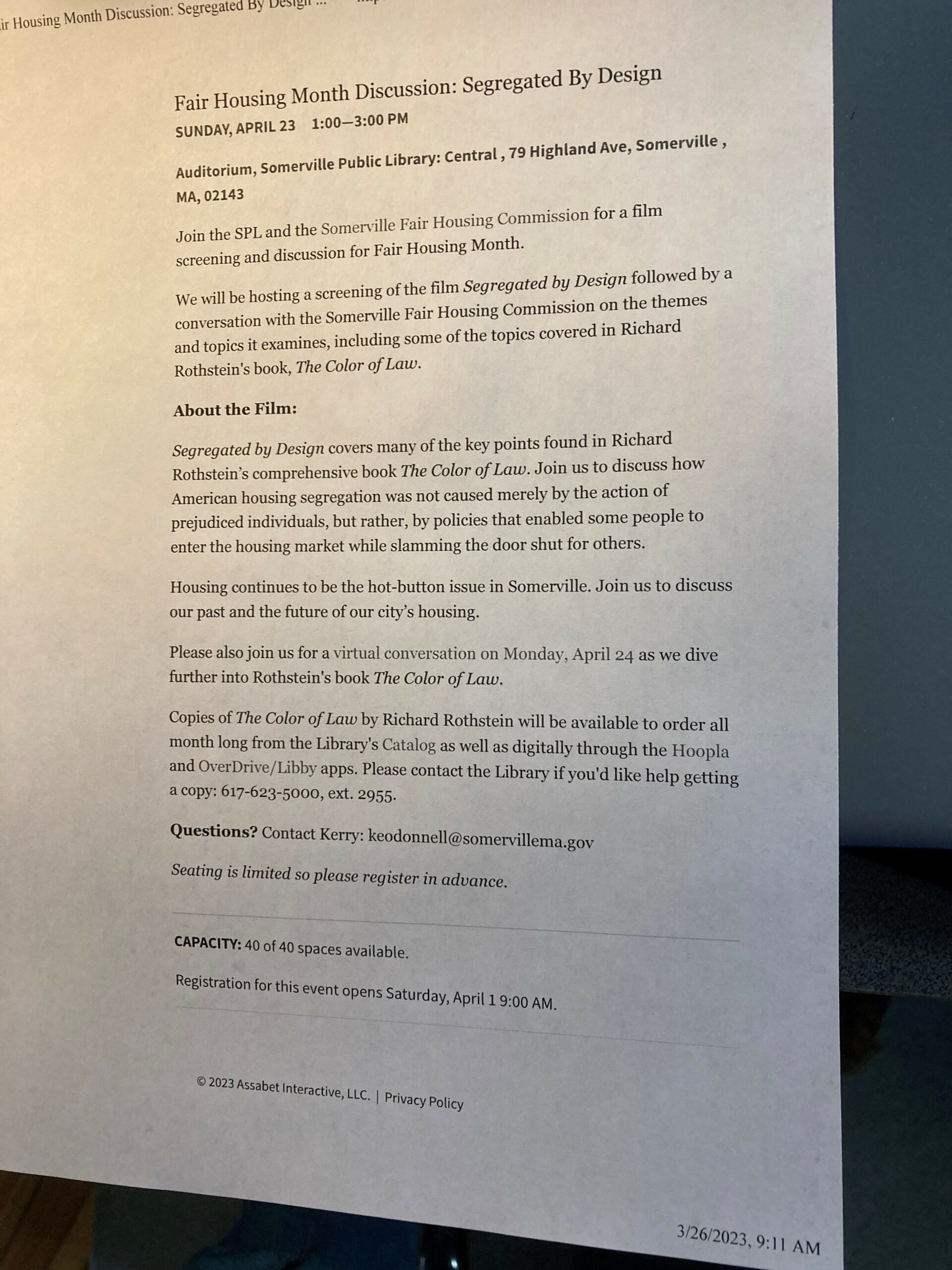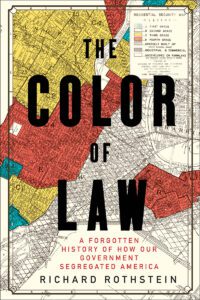The Color of Law (April is Fair Housing Month)

 I am a member of the City of Somerville’s Fair Housing Commission. Last year, we held two book discussions of Richard Rothstein’s The Color of Law. We are doing it again this April.
I am a member of the City of Somerville’s Fair Housing Commission. Last year, we held two book discussions of Richard Rothstein’s The Color of Law. We are doing it again this April.
April 23, 1-3 PM at the Somerville Public Library. Snacks will be served!
April 24, 6:30-8:30 PM on Zoom. Make your own snacks! (Or dinner.)
To understand the structural racism barriers to purchasing and renting a home, you can get an overview by watching this video. Even better, you can join the Somerville Public Library and the Somerville Fair Housing Commission in a discussion of Richard Rothstein’s book The Color of Law.
The book was on the short list of NPR’s best books of 2017
My Goodreads review of The Color of Law:
“There are many unrelentingly factual books about the hard realities of racism to read. They are almost becoming their own sub-genre: “hard books white people need to read.” Within this new genre, this one was, thus far, the easiest one for me to read.
It should have been the hardest, since it is about racism in real estate and that is my career. Some of the reason it was easier to read is that it’s not my first foray into the subgenre. I also think Richard Rothstein held a more objective and neutral tone. It is hard for me to pin down the why, but it mattered.
Part of the why comes in the way that he turned my perspective. The author described policies and programs that I had thought of as good things (like the Federal-Aid Highway Act). He explained how that program took precedence over plans to improve mass transit. It is a bit of new history to me. Growing up, I heard about this great program that I benefit from, not the opportunity missed for (Black) people living in the cities.
Recommendation to white people: If you couldn’t get through Stamped From the Beginning, or similar books, consider reading this one. If you are a Realtor, read this book before April (which is Fair Housing Month). Honest, it is not written to make you feel guilty.”
This review from Economic Policy Institute is more about the content of the book:
“…To scholars and social critics, the racial segregation of our neighborhoods has long been viewed as a manifestation of unscrupulous real estate agents, unethical mortgage lenders, and exclusionary covenants working outside the law. This is what is commonly known as “de facto segregation,” practices that were the outcome of private activity, not law or explicit public policy. Yet, as Rothstein breaks down in case after case, private activity could not have imposed segregation without explicit government policies (de jure segregation) designed to ensure the separation of African Americans from whites.
A former columnist for the New York Times and a research associate at the Economic Policy Institute, as well as a Fellow at the Thurgood Marshall Institute of the NAACP Legal Defense Fund, Rothstein has spent years documenting the evidence that government not merely ignored discriminatory practices in the residential sphere, but promoted them. The impact has been devastating for generations of African-Americans who were denied the right to live where they wanted to live, and raise and school their children where they could flourish most successfully.
While the Fair Housing Act of 1968 provided modest enforcement to prevent future discrimination, it did nothing to reverse or undo a century’s worth of state-sanctioned violations of the Bill of Rights, particularly the Thirteenth Amendment which banned treating former slaves as second-class citizens. So the structural conditions established by 20th century federal policy endure to this day…”
Personal reflections on Fair Housing and me
I have been a Realtor® for over 30 years. I accepted the narrative that real estate agents were drivers of the problem. After reading this book, I realize that real estate professionals cooperated with racist policies, they didn’t create them. I saw and heard casual racism (and sexism, and classism, and antisemitism) on a fairly regular basis. It got more obfuscated over time, but it didn’t go away. The embarrassing stories are still coming, as recently as 2019, Newsday showed how Long Island remains one of the most segregated suburbs in America.
I’ve been a Somerville Fair Housing Commissioner since 2013. It feels a lot like emptying the ocean with a bucket. Our task is educational. We have no authority and no budget. What we can do:
- We work with City staff who answer calls about discrimination and refer them to appropriate agencies. But, those agencies are underfunded and swamped.
- We add what we can, as volunteers to efforts to slow down displacement and support housing stability. Affordable housing goes hand-in-hand with discrimination. Poorer people are more likely to be members of fair housing protected classes. Why? Read the book to understand why.
- We run a Facebook Page to keep Fair Housing on people’s minds and to share inclusionary housing opportunities.
- We also may make it a regular thing to discuss this book with the public. There are Somerville high school students reading it. If you aren’t in high school anymore, I’ll be the teacher who says you should know about this stuff!